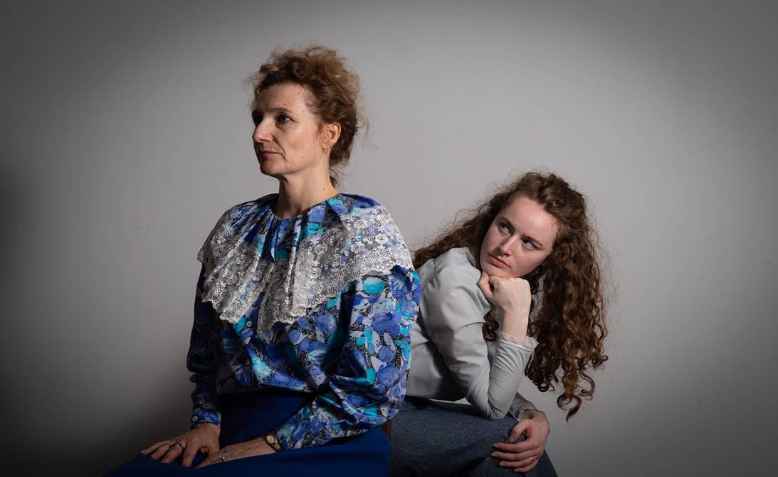 Publicity photo from Rebels and Friends. Photo: Richard Gray/Rugrat Photos
Publicity photo from Rebels and Friends. Photo: Richard Gray/Rugrat Photos
Drama, art and Irish history come together at Unite the Union’s headquarters, finds Ellen Graubart
Choreographer: Sian Williams
Constance: Dolores Devaujany
Eva: Marianne March
Venue: Unite the Union Head Office
Lynx Theatre’s powerful performance (Monday October 21st) of Jacqueline Mulhallen’s play Rebels and Friends was the preview performance of the company’s country-wide tour which will include twenty-two performances, the last four in south London.
The play is based on the lives of two Irish sisters and their role in the fight for freedom for Ireland in the early years of the twentieth century. It is an unusual and imaginative production in that it incorporates and unites all the arts: poetry, art, music, dance and drama. Unite very generously gave the Lynx Theatre company space at their London headquarters for rehearsal and for the preview performance of the play, which Mulhallen wrote thirty years ago, and in which she played the part of Constance.
Rebels and Friends brings to life the history of two remarkable Irish women who played a major part in the Irish Rebellion and fight for Irish freedom from colonialist Britain in the early-twentieth century. Constance Markievicz (born Constance Gore-Booth) was the first woman elected to the British Parliament, but never took her seat. She was one of the leaders of the Easter Rising, and suffered arrest and imprisonment for her actions. She later went on to become Minister of Labour in the (illegal) Dail.
Eva, her sister, was a pacifist and mystical poet who campaigned for conscientious objectors in World War One. With her life-long partner, Esther Roper, she campaigned in northwest England for trade-union rights, education and votes for all women. Eva gave Constance vital support during her difficult times, particularly when her sister was in prison. The two were extremely close, sharing many happy childhood memories.
The two sisters came from the wealthy Gore-Booth family of Sligo, praised for their beauty by the poet W. B. Yeats, but gave up their lives of privilege to fight for Irish independence and the cause of working people who were suffering poverty and destitution.
The two actors, Dolores Devaujany as Constance and Marianne March as Eva, extremely well cast and matched as sisters, delivered a tour-de-force duet of acting and dancing, beautifully choreographed by Sian Williams, Master of Dance at the Globe Theatre and choreographer for the BBC’s Wolf Hall. In spite of the dark period that the sisters lived through and the hardships that Constance in particular faced, they conveyed a strong optimism and hope for a better future for the Irish people, and oppressed people in general.
William Alderson’s production was superb. Rather than being constrained by the small space available for action (after all, the space was designed as a conference room, not as a theatre), Alderson succeeded in transforming a limitation to advantage: two chairs and a small desk were all that were needed as props; recorded voice and music emerged out of the surrounding darkness; a large central screen onto which photographs were projected – not as add-on elements, but as a weaving together into one fabric all of the elements: acting, props, and recorded sound. The result was one seamless whole, taking place in an unrestricted and plausible space.
Alderson’s choice of photographs for the projections provided what, in a more conventional production, would be actual set changes. Stark black-and-white photographs (which Alderson discovered while researching in the archives of the Sligo library) of the poverty and destitution suffered by the Irish working class, and buildings destroyed by bombing (dreadfully reminiscent of the endless scenes of devastation caused by present wars that we see on our television screens every day) are interspersed and given relief by colour photographs of Constance’s paintings and drawings, and Alderson’s own photographs of idyllic woodland and country scenes.
Mulhallen brings to our attention vital aspects of a history that have been left out of, or erased from the public eye, and the part that these two remarkable women played in changing all of our lives. We are living in a time when more and more women – and black people, both women and men – from times past are being ‘discovered’ as having played important roles in the fight to create a fair and just world for everyone. The legacy of British colonialism and the consequences are more and more exposed, but in our own little corner of the world the evils and injustices of British colonialism are still very much in the shadows, away from the eye of the general public. The revival of Rebels and Friends has come at a particularly crucial time, when the Brexit situation has created uncertainty over the prospect of future peace between Northern Ireland and the Irish Republic.

